Individual Reflective Report on Sustainability Assessment 2
VerifiedAdded on 2023/06/10
|9
|2963
|405
Report
AI Summary
This report, titled "Assessment 2: Individual Reflective Sustainability in Personal and Professional Development," delves into the concept of sustainability within the context of personal and professional growth. It begins by defining personal development and its connection to lifelong learning, emphasizing the effective and efficient use of resources to minimize waste. The report highlights the importance of a personal development plan in acquiring new skills and achieving future objectives. The core of the report focuses on managing sustainability, aligning the author's understanding with the Sustainable Development Goals (SDGs). The author discusses the significance of SDGs such as no poverty, zero hunger, quality education, women empowerment, and water conservation. The report then applies the Gibbs Reflective Cycle to a personal experience related to managing educational sustainability in rural areas. The author describes the challenges faced, the feelings experienced, and the evaluation of the situation, leading to an analysis of the experience and the formulation of an action plan for future situations. The report concludes with key learnings and insights gained from the reflective process, emphasizing the importance of understanding different communication methods and recognizing personal capabilities for future development.
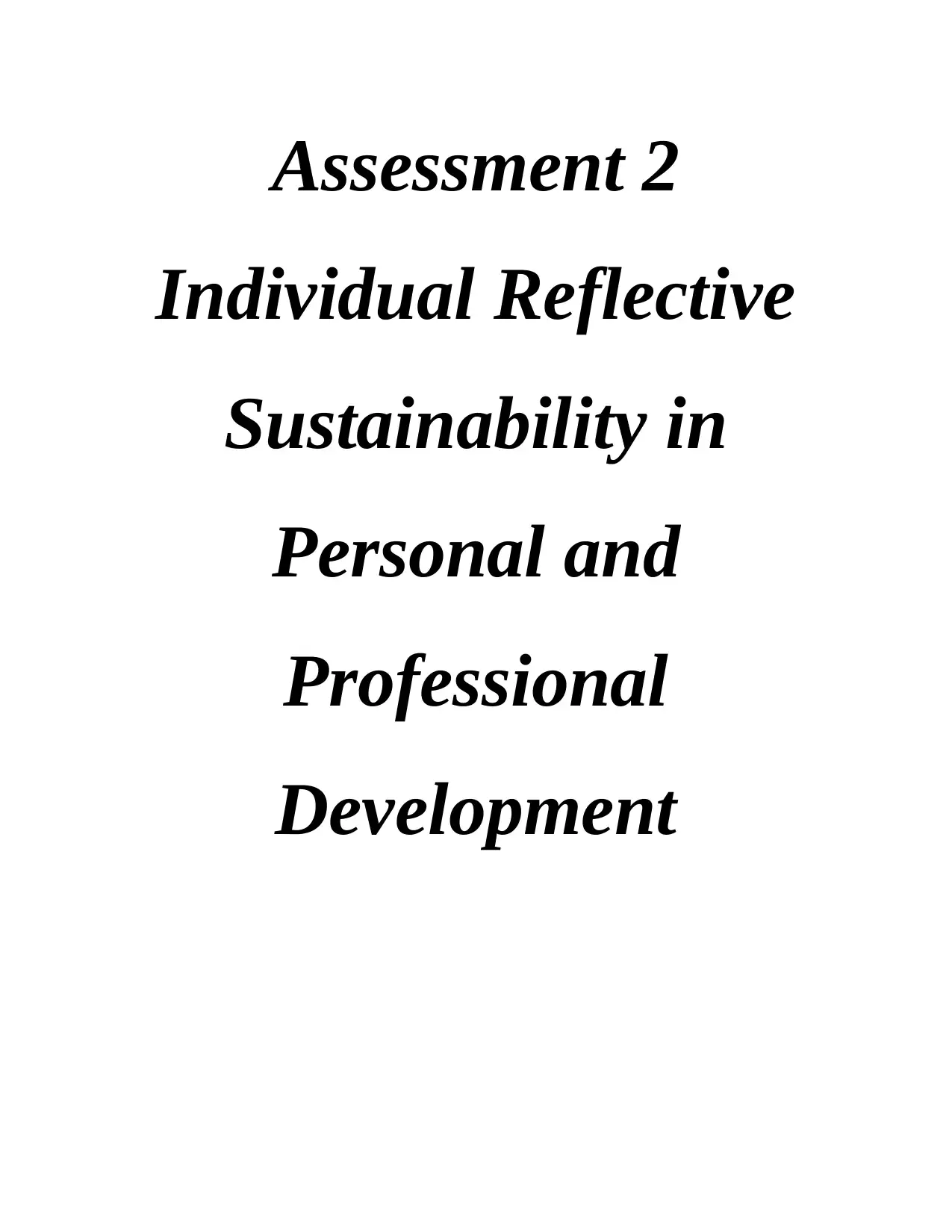
Assessment 2
Individual Reflective
Sustainability in
Personal and
Professional
Development
Individual Reflective
Sustainability in
Personal and
Professional
Development
Paraphrase This Document
Need a fresh take? Get an instant paraphrase of this document with our AI Paraphraser
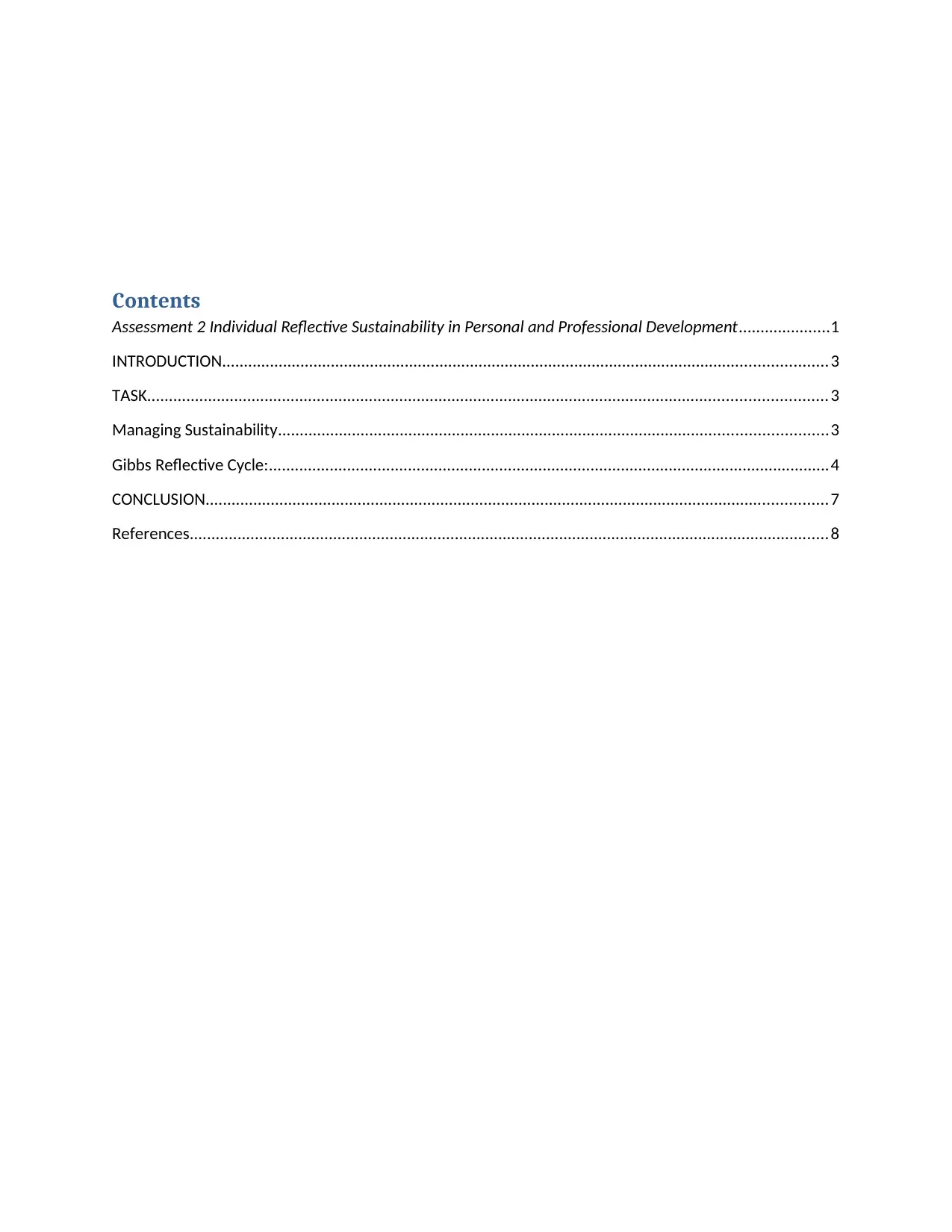
Contents
Assessment 2 Individual Reflective Sustainability in Personal and Professional Development.....................1
INTRODUCTION...........................................................................................................................................3
TASK............................................................................................................................................................3
Managing Sustainability..............................................................................................................................3
Gibbs Reflective Cycle:.................................................................................................................................4
CONCLUSION...............................................................................................................................................7
References...................................................................................................................................................8
Assessment 2 Individual Reflective Sustainability in Personal and Professional Development.....................1
INTRODUCTION...........................................................................................................................................3
TASK............................................................................................................................................................3
Managing Sustainability..............................................................................................................................3
Gibbs Reflective Cycle:.................................................................................................................................4
CONCLUSION...............................................................................................................................................7
References...................................................................................................................................................8
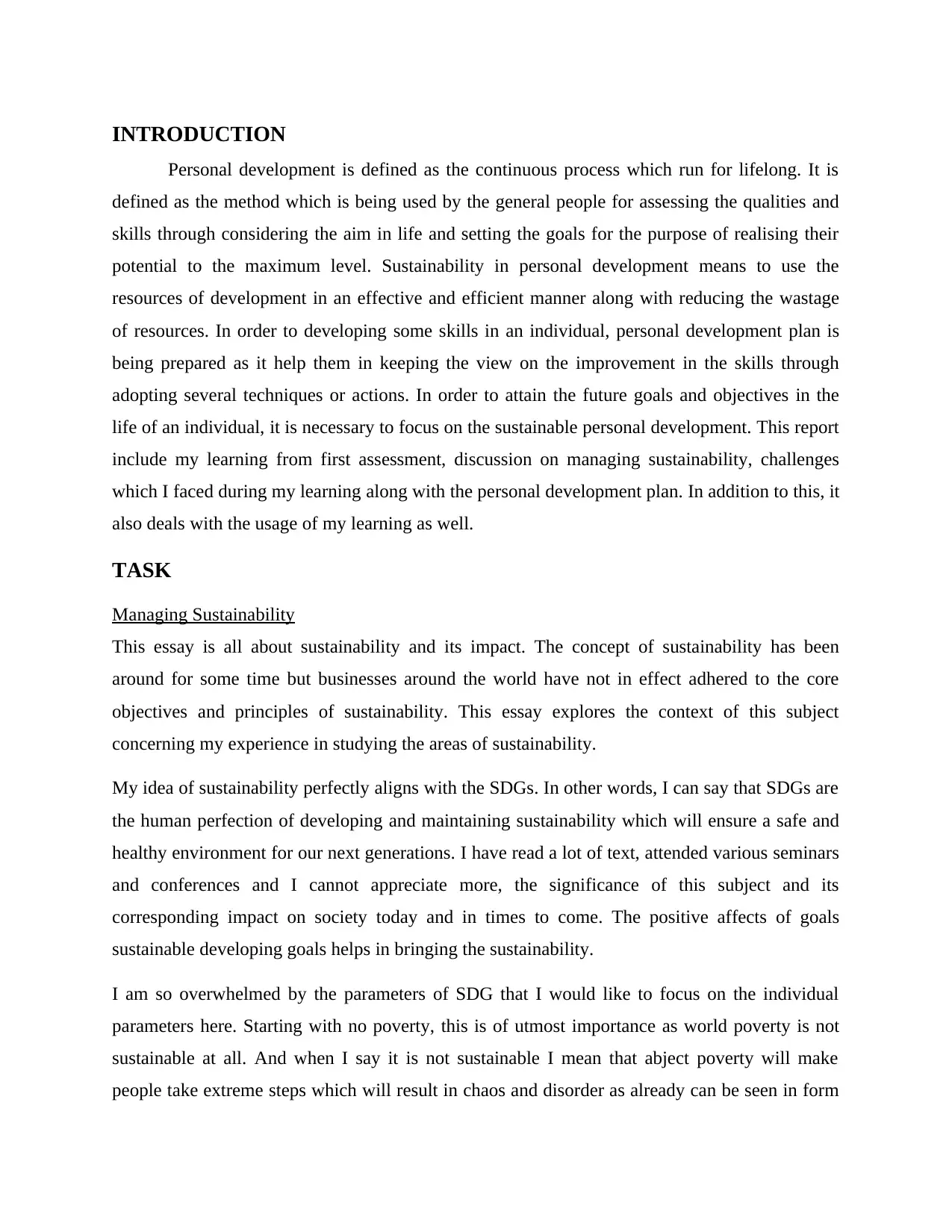
INTRODUCTION
Personal development is defined as the continuous process which run for lifelong. It is
defined as the method which is being used by the general people for assessing the qualities and
skills through considering the aim in life and setting the goals for the purpose of realising their
potential to the maximum level. Sustainability in personal development means to use the
resources of development in an effective and efficient manner along with reducing the wastage
of resources. In order to developing some skills in an individual, personal development plan is
being prepared as it help them in keeping the view on the improvement in the skills through
adopting several techniques or actions. In order to attain the future goals and objectives in the
life of an individual, it is necessary to focus on the sustainable personal development. This report
include my learning from first assessment, discussion on managing sustainability, challenges
which I faced during my learning along with the personal development plan. In addition to this, it
also deals with the usage of my learning as well.
TASK
Managing Sustainability
This essay is all about sustainability and its impact. The concept of sustainability has been
around for some time but businesses around the world have not in effect adhered to the core
objectives and principles of sustainability. This essay explores the context of this subject
concerning my experience in studying the areas of sustainability.
My idea of sustainability perfectly aligns with the SDGs. In other words, I can say that SDGs are
the human perfection of developing and maintaining sustainability which will ensure a safe and
healthy environment for our next generations. I have read a lot of text, attended various seminars
and conferences and I cannot appreciate more, the significance of this subject and its
corresponding impact on society today and in times to come. The positive affects of goals
sustainable developing goals helps in bringing the sustainability.
I am so overwhelmed by the parameters of SDG that I would like to focus on the individual
parameters here. Starting with no poverty, this is of utmost importance as world poverty is not
sustainable at all. And when I say it is not sustainable I mean that abject poverty will make
people take extreme steps which will result in chaos and disorder as already can be seen in form
Personal development is defined as the continuous process which run for lifelong. It is
defined as the method which is being used by the general people for assessing the qualities and
skills through considering the aim in life and setting the goals for the purpose of realising their
potential to the maximum level. Sustainability in personal development means to use the
resources of development in an effective and efficient manner along with reducing the wastage
of resources. In order to developing some skills in an individual, personal development plan is
being prepared as it help them in keeping the view on the improvement in the skills through
adopting several techniques or actions. In order to attain the future goals and objectives in the
life of an individual, it is necessary to focus on the sustainable personal development. This report
include my learning from first assessment, discussion on managing sustainability, challenges
which I faced during my learning along with the personal development plan. In addition to this, it
also deals with the usage of my learning as well.
TASK
Managing Sustainability
This essay is all about sustainability and its impact. The concept of sustainability has been
around for some time but businesses around the world have not in effect adhered to the core
objectives and principles of sustainability. This essay explores the context of this subject
concerning my experience in studying the areas of sustainability.
My idea of sustainability perfectly aligns with the SDGs. In other words, I can say that SDGs are
the human perfection of developing and maintaining sustainability which will ensure a safe and
healthy environment for our next generations. I have read a lot of text, attended various seminars
and conferences and I cannot appreciate more, the significance of this subject and its
corresponding impact on society today and in times to come. The positive affects of goals
sustainable developing goals helps in bringing the sustainability.
I am so overwhelmed by the parameters of SDG that I would like to focus on the individual
parameters here. Starting with no poverty, this is of utmost importance as world poverty is not
sustainable at all. And when I say it is not sustainable I mean that abject poverty will make
people take extreme steps which will result in chaos and disorder as already can be seen in form
⊘ This is a preview!⊘
Do you want full access?
Subscribe today to unlock all pages.

Trusted by 1+ million students worldwide
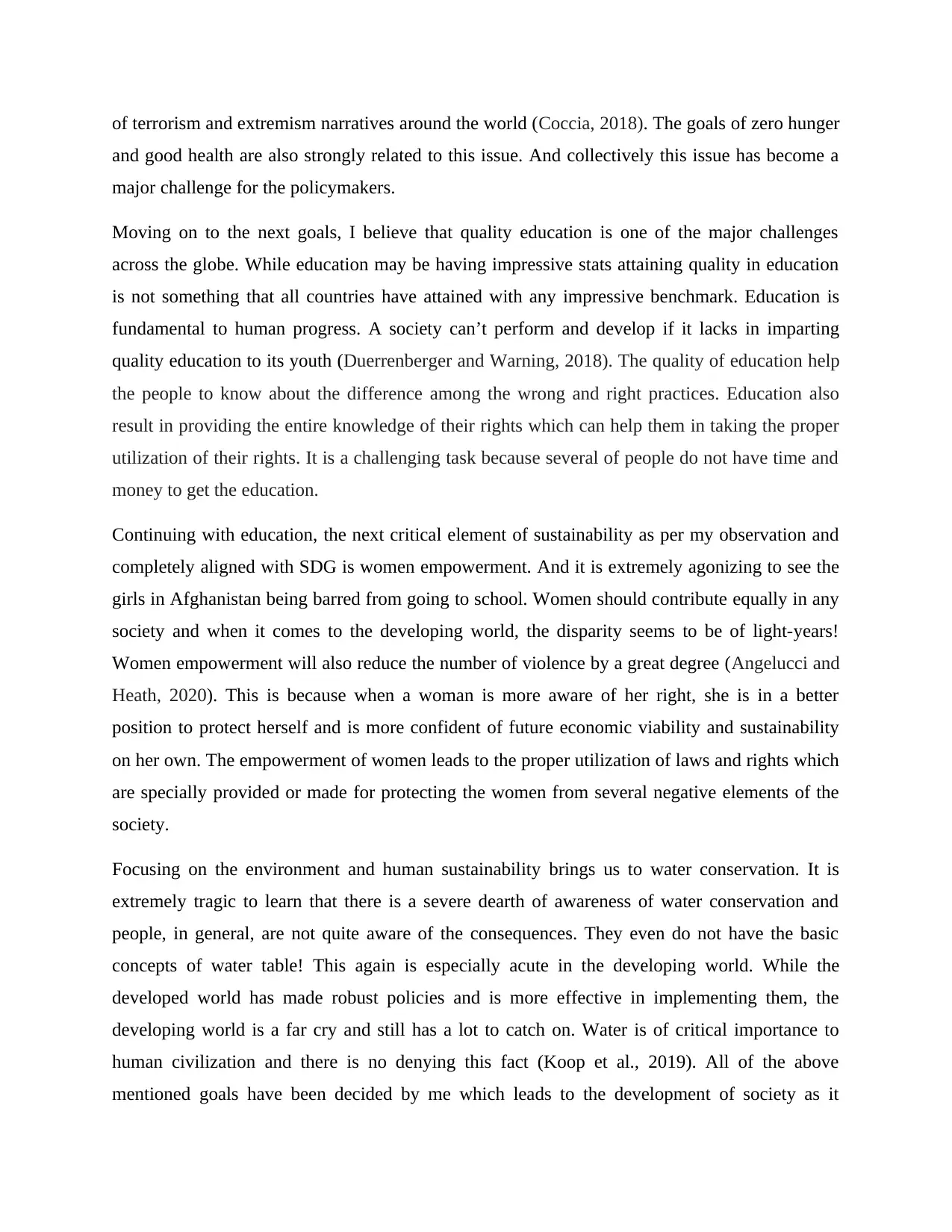
of terrorism and extremism narratives around the world (Coccia, 2018). The goals of zero hunger
and good health are also strongly related to this issue. And collectively this issue has become a
major challenge for the policymakers.
Moving on to the next goals, I believe that quality education is one of the major challenges
across the globe. While education may be having impressive stats attaining quality in education
is not something that all countries have attained with any impressive benchmark. Education is
fundamental to human progress. A society can’t perform and develop if it lacks in imparting
quality education to its youth (Duerrenberger and Warning, 2018). The quality of education help
the people to know about the difference among the wrong and right practices. Education also
result in providing the entire knowledge of their rights which can help them in taking the proper
utilization of their rights. It is a challenging task because several of people do not have time and
money to get the education.
Continuing with education, the next critical element of sustainability as per my observation and
completely aligned with SDG is women empowerment. And it is extremely agonizing to see the
girls in Afghanistan being barred from going to school. Women should contribute equally in any
society and when it comes to the developing world, the disparity seems to be of light-years!
Women empowerment will also reduce the number of violence by a great degree (Angelucci and
Heath, 2020). This is because when a woman is more aware of her right, she is in a better
position to protect herself and is more confident of future economic viability and sustainability
on her own. The empowerment of women leads to the proper utilization of laws and rights which
are specially provided or made for protecting the women from several negative elements of the
society.
Focusing on the environment and human sustainability brings us to water conservation. It is
extremely tragic to learn that there is a severe dearth of awareness of water conservation and
people, in general, are not quite aware of the consequences. They even do not have the basic
concepts of water table! This again is especially acute in the developing world. While the
developed world has made robust policies and is more effective in implementing them, the
developing world is a far cry and still has a lot to catch on. Water is of critical importance to
human civilization and there is no denying this fact (Koop et al., 2019). All of the above
mentioned goals have been decided by me which leads to the development of society as it
and good health are also strongly related to this issue. And collectively this issue has become a
major challenge for the policymakers.
Moving on to the next goals, I believe that quality education is one of the major challenges
across the globe. While education may be having impressive stats attaining quality in education
is not something that all countries have attained with any impressive benchmark. Education is
fundamental to human progress. A society can’t perform and develop if it lacks in imparting
quality education to its youth (Duerrenberger and Warning, 2018). The quality of education help
the people to know about the difference among the wrong and right practices. Education also
result in providing the entire knowledge of their rights which can help them in taking the proper
utilization of their rights. It is a challenging task because several of people do not have time and
money to get the education.
Continuing with education, the next critical element of sustainability as per my observation and
completely aligned with SDG is women empowerment. And it is extremely agonizing to see the
girls in Afghanistan being barred from going to school. Women should contribute equally in any
society and when it comes to the developing world, the disparity seems to be of light-years!
Women empowerment will also reduce the number of violence by a great degree (Angelucci and
Heath, 2020). This is because when a woman is more aware of her right, she is in a better
position to protect herself and is more confident of future economic viability and sustainability
on her own. The empowerment of women leads to the proper utilization of laws and rights which
are specially provided or made for protecting the women from several negative elements of the
society.
Focusing on the environment and human sustainability brings us to water conservation. It is
extremely tragic to learn that there is a severe dearth of awareness of water conservation and
people, in general, are not quite aware of the consequences. They even do not have the basic
concepts of water table! This again is especially acute in the developing world. While the
developed world has made robust policies and is more effective in implementing them, the
developing world is a far cry and still has a lot to catch on. Water is of critical importance to
human civilization and there is no denying this fact (Koop et al., 2019). All of the above
mentioned goals have been decided by me which leads to the development of society as it
Paraphrase This Document
Need a fresh take? Get an instant paraphrase of this document with our AI Paraphraser
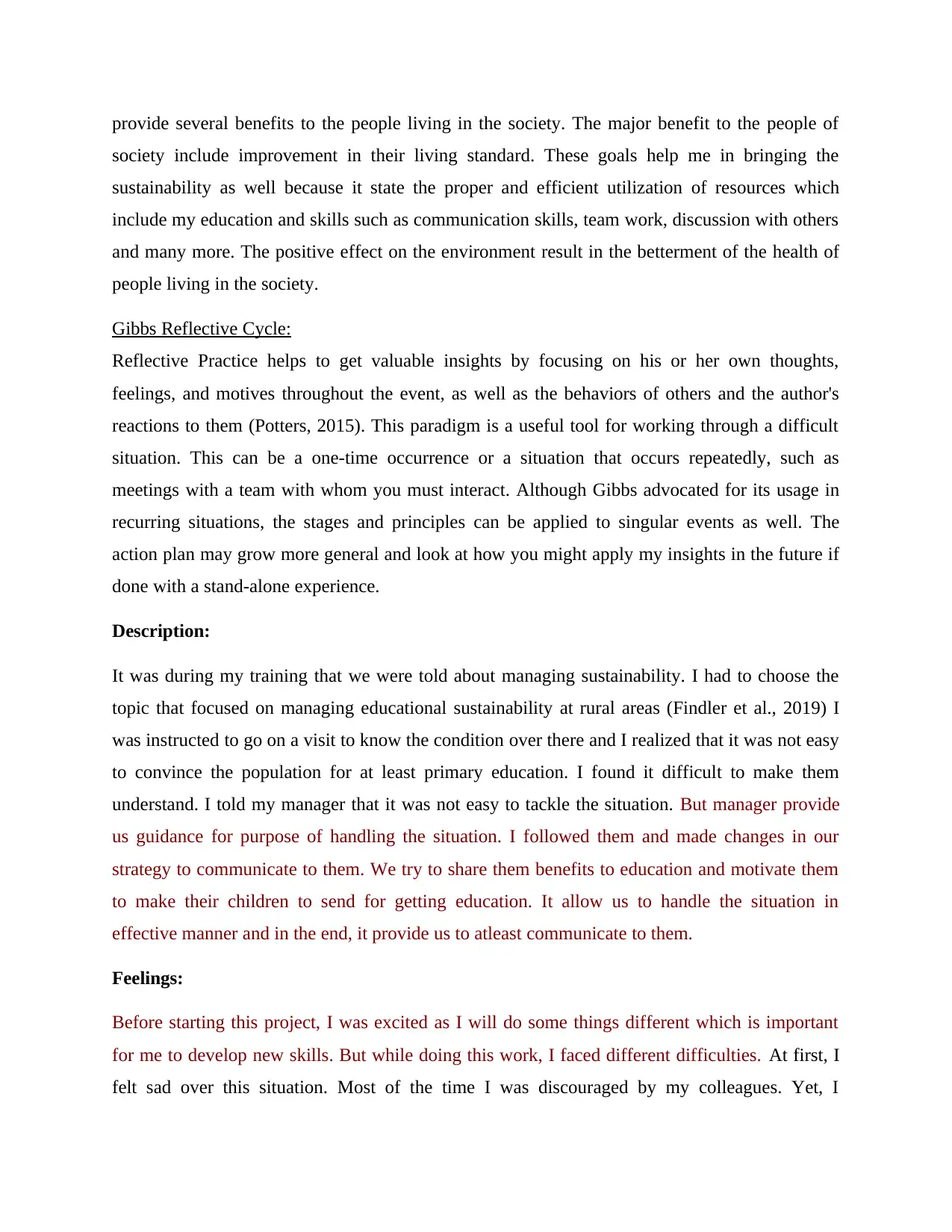
provide several benefits to the people living in the society. The major benefit to the people of
society include improvement in their living standard. These goals help me in bringing the
sustainability as well because it state the proper and efficient utilization of resources which
include my education and skills such as communication skills, team work, discussion with others
and many more. The positive effect on the environment result in the betterment of the health of
people living in the society.
Gibbs Reflective Cycle:
Reflective Practice helps to get valuable insights by focusing on his or her own thoughts,
feelings, and motives throughout the event, as well as the behaviors of others and the author's
reactions to them (Potters, 2015). This paradigm is a useful tool for working through a difficult
situation. This can be a one-time occurrence or a situation that occurs repeatedly, such as
meetings with a team with whom you must interact. Although Gibbs advocated for its usage in
recurring situations, the stages and principles can be applied to singular events as well. The
action plan may grow more general and look at how you might apply my insights in the future if
done with a stand-alone experience.
Description:
It was during my training that we were told about managing sustainability. I had to choose the
topic that focused on managing educational sustainability at rural areas (Findler et al., 2019) I
was instructed to go on a visit to know the condition over there and I realized that it was not easy
to convince the population for at least primary education. I found it difficult to make them
understand. I told my manager that it was not easy to tackle the situation. But manager provide
us guidance for purpose of handling the situation. I followed them and made changes in our
strategy to communicate to them. We try to share them benefits to education and motivate them
to make their children to send for getting education. It allow us to handle the situation in
effective manner and in the end, it provide us to atleast communicate to them.
Feelings:
Before starting this project, I was excited as I will do some things different which is important
for me to develop new skills. But while doing this work, I faced different difficulties. At first, I
felt sad over this situation. Most of the time I was discouraged by my colleagues. Yet, I
society include improvement in their living standard. These goals help me in bringing the
sustainability as well because it state the proper and efficient utilization of resources which
include my education and skills such as communication skills, team work, discussion with others
and many more. The positive effect on the environment result in the betterment of the health of
people living in the society.
Gibbs Reflective Cycle:
Reflective Practice helps to get valuable insights by focusing on his or her own thoughts,
feelings, and motives throughout the event, as well as the behaviors of others and the author's
reactions to them (Potters, 2015). This paradigm is a useful tool for working through a difficult
situation. This can be a one-time occurrence or a situation that occurs repeatedly, such as
meetings with a team with whom you must interact. Although Gibbs advocated for its usage in
recurring situations, the stages and principles can be applied to singular events as well. The
action plan may grow more general and look at how you might apply my insights in the future if
done with a stand-alone experience.
Description:
It was during my training that we were told about managing sustainability. I had to choose the
topic that focused on managing educational sustainability at rural areas (Findler et al., 2019) I
was instructed to go on a visit to know the condition over there and I realized that it was not easy
to convince the population for at least primary education. I found it difficult to make them
understand. I told my manager that it was not easy to tackle the situation. But manager provide
us guidance for purpose of handling the situation. I followed them and made changes in our
strategy to communicate to them. We try to share them benefits to education and motivate them
to make their children to send for getting education. It allow us to handle the situation in
effective manner and in the end, it provide us to atleast communicate to them.
Feelings:
Before starting this project, I was excited as I will do some things different which is important
for me to develop new skills. But while doing this work, I faced different difficulties. At first, I
felt sad over this situation. Most of the time I was discouraged by my colleagues. Yet, I
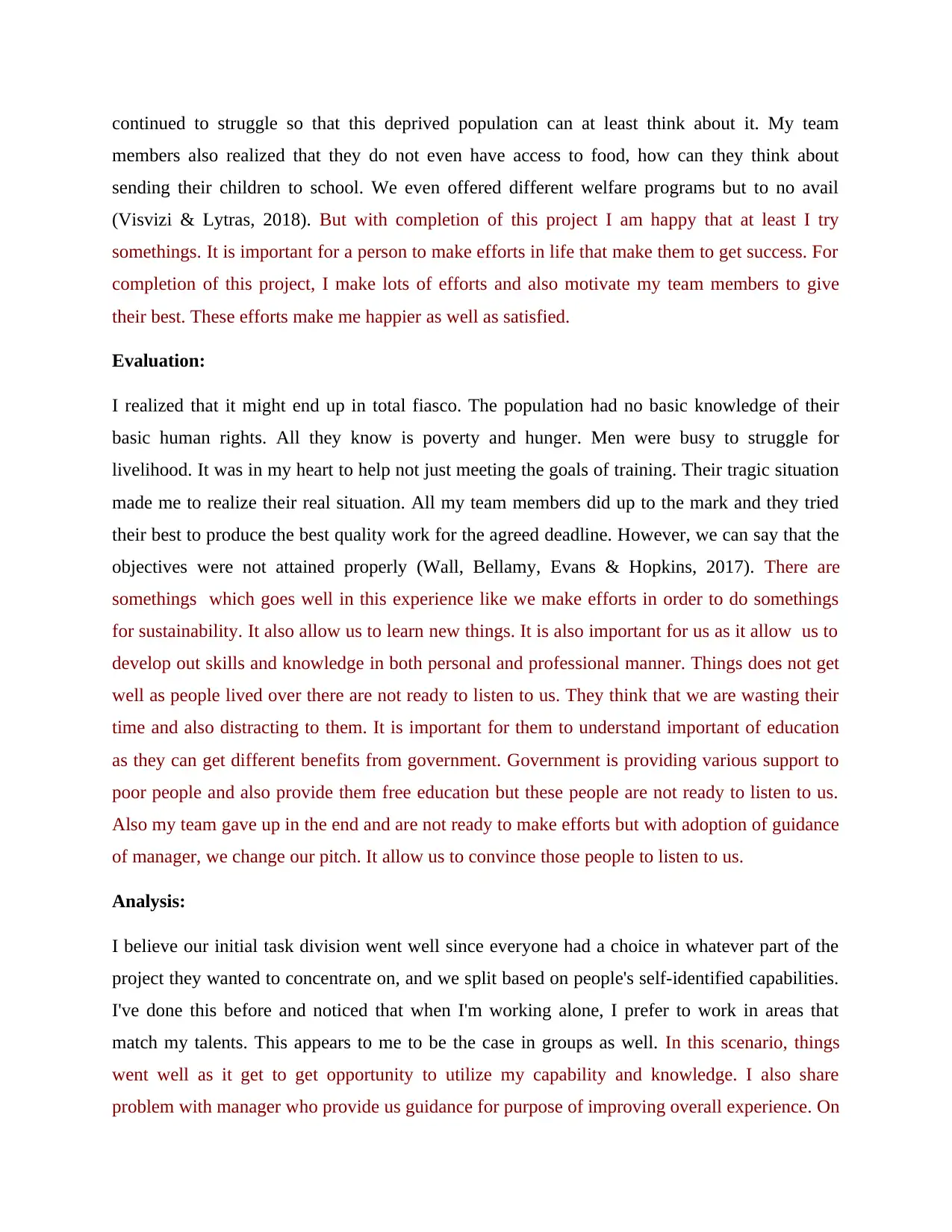
continued to struggle so that this deprived population can at least think about it. My team
members also realized that they do not even have access to food, how can they think about
sending their children to school. We even offered different welfare programs but to no avail
(Visvizi & Lytras, 2018). But with completion of this project I am happy that at least I try
somethings. It is important for a person to make efforts in life that make them to get success. For
completion of this project, I make lots of efforts and also motivate my team members to give
their best. These efforts make me happier as well as satisfied.
Evaluation:
I realized that it might end up in total fiasco. The population had no basic knowledge of their
basic human rights. All they know is poverty and hunger. Men were busy to struggle for
livelihood. It was in my heart to help not just meeting the goals of training. Their tragic situation
made me to realize their real situation. All my team members did up to the mark and they tried
their best to produce the best quality work for the agreed deadline. However, we can say that the
objectives were not attained properly (Wall, Bellamy, Evans & Hopkins, 2017). There are
somethings which goes well in this experience like we make efforts in order to do somethings
for sustainability. It also allow us to learn new things. It is also important for us as it allow us to
develop out skills and knowledge in both personal and professional manner. Things does not get
well as people lived over there are not ready to listen to us. They think that we are wasting their
time and also distracting to them. It is important for them to understand important of education
as they can get different benefits from government. Government is providing various support to
poor people and also provide them free education but these people are not ready to listen to us.
Also my team gave up in the end and are not ready to make efforts but with adoption of guidance
of manager, we change our pitch. It allow us to convince those people to listen to us.
Analysis:
I believe our initial task division went well since everyone had a choice in whatever part of the
project they wanted to concentrate on, and we split based on people's self-identified capabilities.
I've done this before and noticed that when I'm working alone, I prefer to work in areas that
match my talents. This appears to me to be the case in groups as well. In this scenario, things
went well as it get to get opportunity to utilize my capability and knowledge. I also share
problem with manager who provide us guidance for purpose of improving overall experience. On
members also realized that they do not even have access to food, how can they think about
sending their children to school. We even offered different welfare programs but to no avail
(Visvizi & Lytras, 2018). But with completion of this project I am happy that at least I try
somethings. It is important for a person to make efforts in life that make them to get success. For
completion of this project, I make lots of efforts and also motivate my team members to give
their best. These efforts make me happier as well as satisfied.
Evaluation:
I realized that it might end up in total fiasco. The population had no basic knowledge of their
basic human rights. All they know is poverty and hunger. Men were busy to struggle for
livelihood. It was in my heart to help not just meeting the goals of training. Their tragic situation
made me to realize their real situation. All my team members did up to the mark and they tried
their best to produce the best quality work for the agreed deadline. However, we can say that the
objectives were not attained properly (Wall, Bellamy, Evans & Hopkins, 2017). There are
somethings which goes well in this experience like we make efforts in order to do somethings
for sustainability. It also allow us to learn new things. It is also important for us as it allow us to
develop out skills and knowledge in both personal and professional manner. Things does not get
well as people lived over there are not ready to listen to us. They think that we are wasting their
time and also distracting to them. It is important for them to understand important of education
as they can get different benefits from government. Government is providing various support to
poor people and also provide them free education but these people are not ready to listen to us.
Also my team gave up in the end and are not ready to make efforts but with adoption of guidance
of manager, we change our pitch. It allow us to convince those people to listen to us.
Analysis:
I believe our initial task division went well since everyone had a choice in whatever part of the
project they wanted to concentrate on, and we split based on people's self-identified capabilities.
I've done this before and noticed that when I'm working alone, I prefer to work in areas that
match my talents. This appears to me to be the case in groups as well. In this scenario, things
went well as it get to get opportunity to utilize my capability and knowledge. I also share
problem with manager who provide us guidance for purpose of improving overall experience. On
⊘ This is a preview!⊘
Do you want full access?
Subscribe today to unlock all pages.

Trusted by 1+ million students worldwide
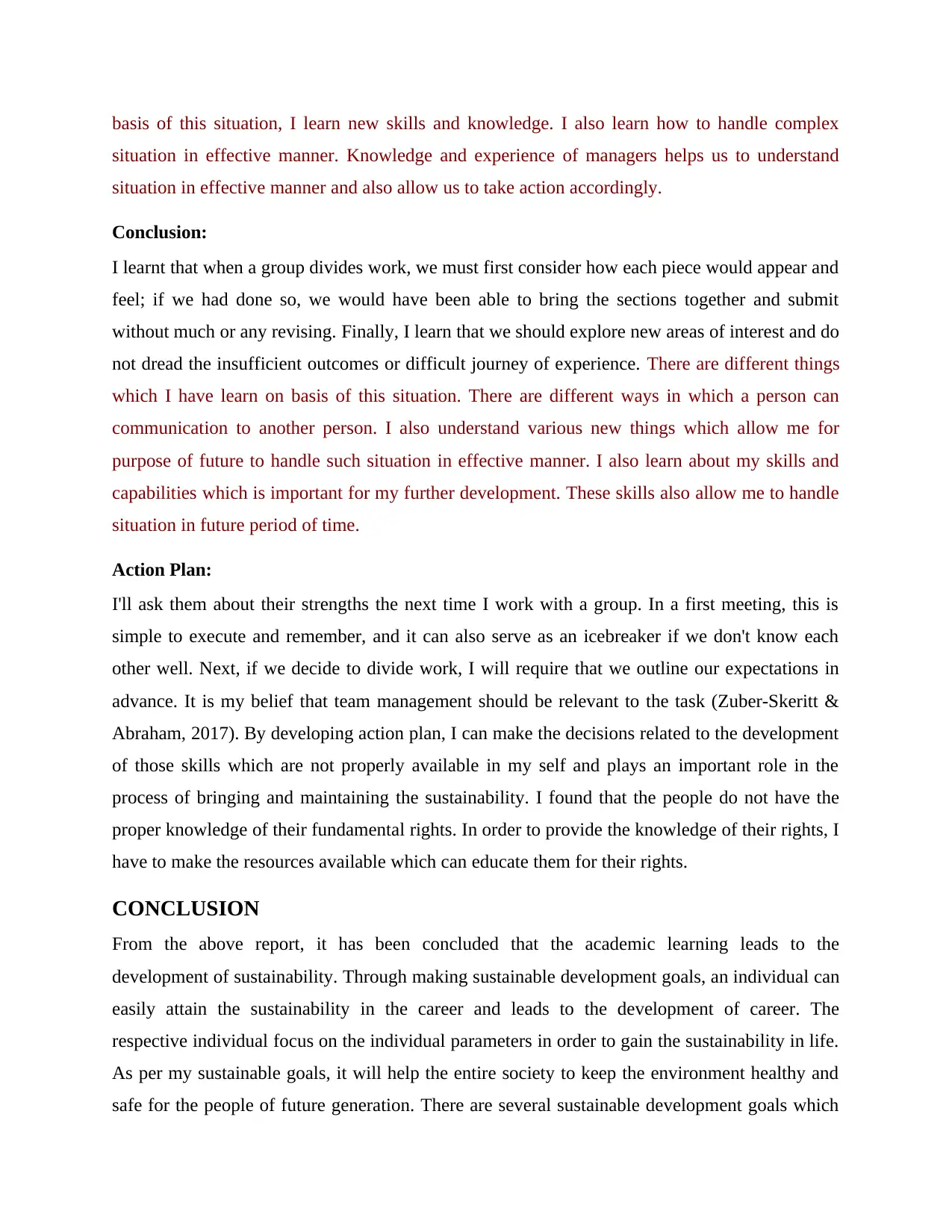
basis of this situation, I learn new skills and knowledge. I also learn how to handle complex
situation in effective manner. Knowledge and experience of managers helps us to understand
situation in effective manner and also allow us to take action accordingly.
Conclusion:
I learnt that when a group divides work, we must first consider how each piece would appear and
feel; if we had done so, we would have been able to bring the sections together and submit
without much or any revising. Finally, I learn that we should explore new areas of interest and do
not dread the insufficient outcomes or difficult journey of experience. There are different things
which I have learn on basis of this situation. There are different ways in which a person can
communication to another person. I also understand various new things which allow me for
purpose of future to handle such situation in effective manner. I also learn about my skills and
capabilities which is important for my further development. These skills also allow me to handle
situation in future period of time.
Action Plan:
I'll ask them about their strengths the next time I work with a group. In a first meeting, this is
simple to execute and remember, and it can also serve as an icebreaker if we don't know each
other well. Next, if we decide to divide work, I will require that we outline our expectations in
advance. It is my belief that team management should be relevant to the task (Zuber-Skeritt &
Abraham, 2017). By developing action plan, I can make the decisions related to the development
of those skills which are not properly available in my self and plays an important role in the
process of bringing and maintaining the sustainability. I found that the people do not have the
proper knowledge of their fundamental rights. In order to provide the knowledge of their rights, I
have to make the resources available which can educate them for their rights.
CONCLUSION
From the above report, it has been concluded that the academic learning leads to the
development of sustainability. Through making sustainable development goals, an individual can
easily attain the sustainability in the career and leads to the development of career. The
respective individual focus on the individual parameters in order to gain the sustainability in life.
As per my sustainable goals, it will help the entire society to keep the environment healthy and
safe for the people of future generation. There are several sustainable development goals which
situation in effective manner. Knowledge and experience of managers helps us to understand
situation in effective manner and also allow us to take action accordingly.
Conclusion:
I learnt that when a group divides work, we must first consider how each piece would appear and
feel; if we had done so, we would have been able to bring the sections together and submit
without much or any revising. Finally, I learn that we should explore new areas of interest and do
not dread the insufficient outcomes or difficult journey of experience. There are different things
which I have learn on basis of this situation. There are different ways in which a person can
communication to another person. I also understand various new things which allow me for
purpose of future to handle such situation in effective manner. I also learn about my skills and
capabilities which is important for my further development. These skills also allow me to handle
situation in future period of time.
Action Plan:
I'll ask them about their strengths the next time I work with a group. In a first meeting, this is
simple to execute and remember, and it can also serve as an icebreaker if we don't know each
other well. Next, if we decide to divide work, I will require that we outline our expectations in
advance. It is my belief that team management should be relevant to the task (Zuber-Skeritt &
Abraham, 2017). By developing action plan, I can make the decisions related to the development
of those skills which are not properly available in my self and plays an important role in the
process of bringing and maintaining the sustainability. I found that the people do not have the
proper knowledge of their fundamental rights. In order to provide the knowledge of their rights, I
have to make the resources available which can educate them for their rights.
CONCLUSION
From the above report, it has been concluded that the academic learning leads to the
development of sustainability. Through making sustainable development goals, an individual can
easily attain the sustainability in the career and leads to the development of career. The
respective individual focus on the individual parameters in order to gain the sustainability in life.
As per my sustainable goals, it will help the entire society to keep the environment healthy and
safe for the people of future generation. There are several sustainable development goals which
Paraphrase This Document
Need a fresh take? Get an instant paraphrase of this document with our AI Paraphraser
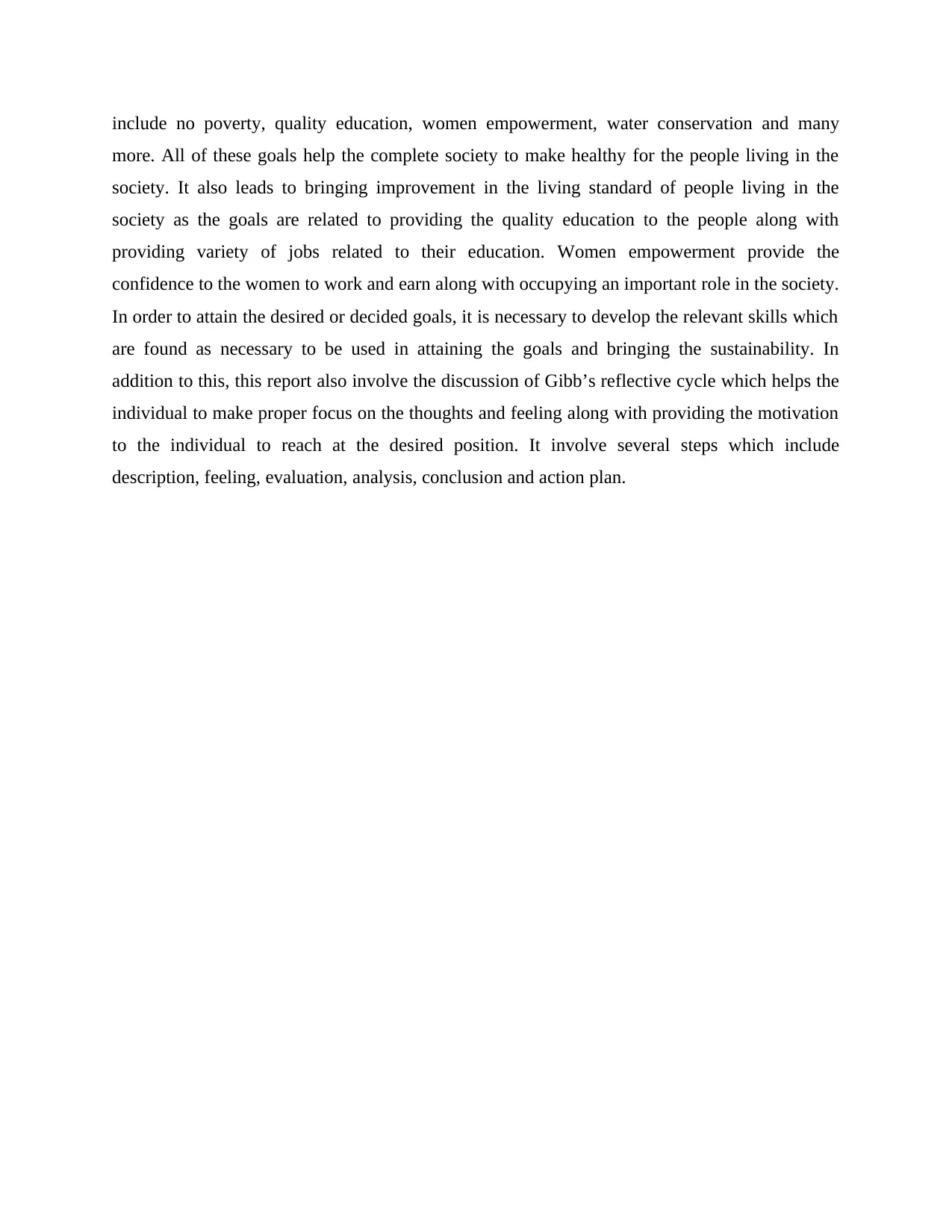
include no poverty, quality education, women empowerment, water conservation and many
more. All of these goals help the complete society to make healthy for the people living in the
society. It also leads to bringing improvement in the living standard of people living in the
society as the goals are related to providing the quality education to the people along with
providing variety of jobs related to their education. Women empowerment provide the
confidence to the women to work and earn along with occupying an important role in the society.
In order to attain the desired or decided goals, it is necessary to develop the relevant skills which
are found as necessary to be used in attaining the goals and bringing the sustainability. In
addition to this, this report also involve the discussion of Gibb’s reflective cycle which helps the
individual to make proper focus on the thoughts and feeling along with providing the motivation
to the individual to reach at the desired position. It involve several steps which include
description, feeling, evaluation, analysis, conclusion and action plan.
more. All of these goals help the complete society to make healthy for the people living in the
society. It also leads to bringing improvement in the living standard of people living in the
society as the goals are related to providing the quality education to the people along with
providing variety of jobs related to their education. Women empowerment provide the
confidence to the women to work and earn along with occupying an important role in the society.
In order to attain the desired or decided goals, it is necessary to develop the relevant skills which
are found as necessary to be used in attaining the goals and bringing the sustainability. In
addition to this, this report also involve the discussion of Gibb’s reflective cycle which helps the
individual to make proper focus on the thoughts and feeling along with providing the motivation
to the individual to reach at the desired position. It involve several steps which include
description, feeling, evaluation, analysis, conclusion and action plan.
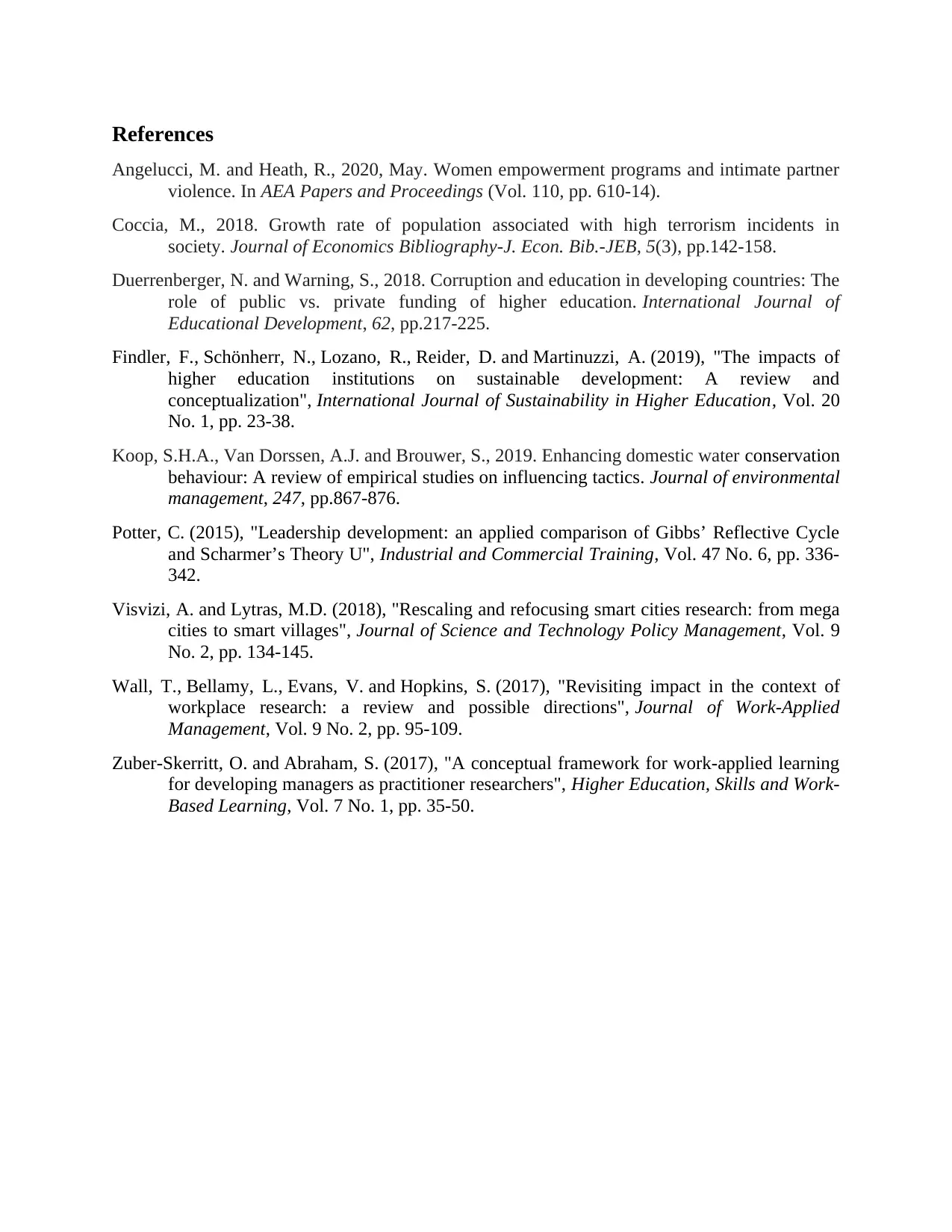
References
Angelucci, M. and Heath, R., 2020, May. Women empowerment programs and intimate partner
violence. In AEA Papers and Proceedings (Vol. 110, pp. 610-14).
Coccia, M., 2018. Growth rate of population associated with high terrorism incidents in
society. Journal of Economics Bibliography-J. Econ. Bib.-JEB, 5(3), pp.142-158.
Duerrenberger, N. and Warning, S., 2018. Corruption and education in developing countries: The
role of public vs. private funding of higher education. International Journal of
Educational Development, 62, pp.217-225.
Findler, F., Schönherr, N., Lozano, R., Reider, D. and Martinuzzi, A. (2019), "The impacts of
higher education institutions on sustainable development: A review and
conceptualization", International Journal of Sustainability in Higher Education, Vol. 20
No. 1, pp. 23-38.
Koop, S.H.A., Van Dorssen, A.J. and Brouwer, S., 2019. Enhancing domestic water conservation
behaviour: A review of empirical studies on influencing tactics. Journal of environmental
management, 247, pp.867-876.
Potter, C. (2015), "Leadership development: an applied comparison of Gibbs’ Reflective Cycle
and Scharmer’s Theory U", Industrial and Commercial Training, Vol. 47 No. 6, pp. 336-
342.
Visvizi, A. and Lytras, M.D. (2018), "Rescaling and refocusing smart cities research: from mega
cities to smart villages", Journal of Science and Technology Policy Management, Vol. 9
No. 2, pp. 134-145.
Wall, T., Bellamy, L., Evans, V. and Hopkins, S. (2017), "Revisiting impact in the context of
workplace research: a review and possible directions", Journal of Work-Applied
Management, Vol. 9 No. 2, pp. 95-109.
Zuber-Skerritt, O. and Abraham, S. (2017), "A conceptual framework for work-applied learning
for developing managers as practitioner researchers", Higher Education, Skills and Work-
Based Learning, Vol. 7 No. 1, pp. 35-50.
Angelucci, M. and Heath, R., 2020, May. Women empowerment programs and intimate partner
violence. In AEA Papers and Proceedings (Vol. 110, pp. 610-14).
Coccia, M., 2018. Growth rate of population associated with high terrorism incidents in
society. Journal of Economics Bibliography-J. Econ. Bib.-JEB, 5(3), pp.142-158.
Duerrenberger, N. and Warning, S., 2018. Corruption and education in developing countries: The
role of public vs. private funding of higher education. International Journal of
Educational Development, 62, pp.217-225.
Findler, F., Schönherr, N., Lozano, R., Reider, D. and Martinuzzi, A. (2019), "The impacts of
higher education institutions on sustainable development: A review and
conceptualization", International Journal of Sustainability in Higher Education, Vol. 20
No. 1, pp. 23-38.
Koop, S.H.A., Van Dorssen, A.J. and Brouwer, S., 2019. Enhancing domestic water conservation
behaviour: A review of empirical studies on influencing tactics. Journal of environmental
management, 247, pp.867-876.
Potter, C. (2015), "Leadership development: an applied comparison of Gibbs’ Reflective Cycle
and Scharmer’s Theory U", Industrial and Commercial Training, Vol. 47 No. 6, pp. 336-
342.
Visvizi, A. and Lytras, M.D. (2018), "Rescaling and refocusing smart cities research: from mega
cities to smart villages", Journal of Science and Technology Policy Management, Vol. 9
No. 2, pp. 134-145.
Wall, T., Bellamy, L., Evans, V. and Hopkins, S. (2017), "Revisiting impact in the context of
workplace research: a review and possible directions", Journal of Work-Applied
Management, Vol. 9 No. 2, pp. 95-109.
Zuber-Skerritt, O. and Abraham, S. (2017), "A conceptual framework for work-applied learning
for developing managers as practitioner researchers", Higher Education, Skills and Work-
Based Learning, Vol. 7 No. 1, pp. 35-50.
⊘ This is a preview!⊘
Do you want full access?
Subscribe today to unlock all pages.

Trusted by 1+ million students worldwide
1 out of 9
Related Documents
Your All-in-One AI-Powered Toolkit for Academic Success.
+13062052269
info@desklib.com
Available 24*7 on WhatsApp / Email
![[object Object]](/_next/static/media/star-bottom.7253800d.svg)
Unlock your academic potential
Copyright © 2020–2026 A2Z Services. All Rights Reserved. Developed and managed by ZUCOL.





